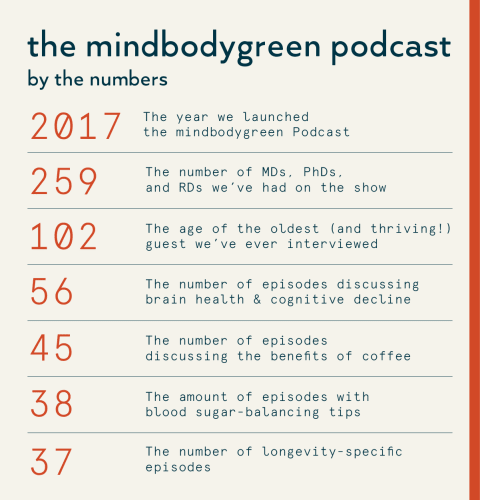
Image by filadendron / iStock
August 28, 2023
We did it: We’ve made it to the 500th episode of the mindbodygreen Podcast. What a journey it’s been since we launched in 2017! Just take a look at the stats:
Advertisement
This ad is displayed using third party content and we do not control its accessibility features.

We are so grateful for all of you who have tuned in over the years, whether you listen on your favorite audio platform or watch on YouTube. Let me tell you, it’s only going to get better.
And better starts now.
Today, we’re officially launching the mindbodygreen Podcast Premium membership. For just $7 a month, members will gain early access to our weekly episodes, browse curated playlists, and enjoy ad-free listening. As a member, you’ll also receive bonus content like AMAs, and exclusive interviews only available to subscribers. Last but not least, members can score a 10% exclusive discount on all products—including all of our supplements, personal care products, and classes.
OK, enough chat. (You can check out the sign up page here, if you’d like more details.) Let’s dive into the top five longevity tips we’ve learned from our expansive podcast library. Be sure to take advantage of our premium membership and tune in to our regular weekly drops—there will certainly be more tips to come.
Make no mistake: Purpose is just as important as exercise and nutrition when it comes to longevity. After all, identifying—and maintaining—your why in this life is crucial in order to extend it.
Howard Tucker, M.D., a 101-year-old, still-practicing neurologist, specifically finds purpose in his work. “Retirement remains the enemy of longevity,” he shares on the podcast. “I’m so sure about that.” A 2021 study even found that retired participants were more likely to experience cognitive decline than non-retired individuals1.
Top memory coach Jim Kwik backs up the claim during his podcast interview: “When people retire, their minds also retire, and their body is not far behind,” he says.
That’s not to say your job is your only avenue for purpose. “If you do retire, [try] meaningful volunteering,” Tucker notes. “That’s acceptable because it maintains your interests and your vitality.” You could also take a class, learn a new hobby, join a book club, etc. Just find something that interests you and keeps you vibrant.
Advertisement
This ad is displayed using third party content and we do not control its accessibility features.
We likely don’t need to remind you how important exercise is for longevity2. But rather than hitting the gym for an hour and calling it a day, mobility pioneers Kelly and Juliet Starrett (catch them on our “Fitness” premium playlist!) recommend a series of simple, everyday activities that enhance your capacity for free and easy movement—like a daily walk.
“If there’s a pill you could take that will reduce your all-cause mortality by 50%, you can give it to your whole family, and it’s free, everyone’s going to take that pill,” says Kelly during the episode. It turns out, that “pill” exists—it’s walking 8,000 steps a day3. “The research is very clear that when people walk just 8,000 steps3, they get the lion’s share of benefits. Not 10,000 steps. Not 12,000 [steps]… 8,000 steps,” Kelly adds.
Once you start walking regularly, “then you can start to dress this thing up,” says Kelly. For example, he likes to practice breathwork while walking his daughter to school (a 10-second inhale, hold, then a nose-only exhale) to simultaneously increase his CO2 tolerance. “Those walks became very, very intense,” he recounts. Here, you can find more tips to “dress up” your daily walk—just make sure you have a basic step count under your belt.
3.
Foster quality connections
Humans are social beings, so it makes sense social connection is crucial for a longer, healthier life. In fact, humans have a biological need for social connection.
“Social connection is the greatest factor we know in longevity and happiness,” says personalized medicine physician Molly Maloof, M.D., in her episode. Research has even shown that social isolation was associated with a higher risk of developing dementia. On the flip-side, a study on elderly individuals found that those who provided emotional support to others ended up living longer lives4.
And yet: “I just don’t think we prioritize it like we do weight, food, movement, and stress management,” she adds. So we should consider nurturing positive social relationships a “biohack” for longevity. (Psst: Members can find more of Maloof’s biohacking tips in our “Women’s Health” premium playlist.)
Gladys McGarey, M.D., a 102-year-old practicing integrative medicine doctor, would agree: “Love really is a great healer in the long run,” she explains on the podcast.
Learn how to fill your health gaps in 90 seconds.

4.
Take advantage of new-age tools
We’ve discussed simple-yet-powerful longevity staples, but there is absolutely a time and place for buzzy biohacking technology. It’s an exciting time to explore longevity treatments—why not take advantage of them if you can?
Take NAD+ therapy, for instance: “We have NAD+ constantly in every cell in our bodies all the time, going from a high energy state to a low energy state and facilitating expansive biochemical reactions,” explains Matt Cook, M.D., founder of BioReset Medical, during his interview. “Those could be making energy in your mitochondria, turning on DNA repair, [or] turning on sirtuin super-family, which has to do with extending longevity.”
Like most good things, your natural supply of NAD+ declines with age—but supporting your NAD+ through supplements, lifestyle habits, and treatments can help you maintain solid levels. One that Cook is particularly interested in is NAD+ IV therapy, where NAD+ is administered through a vein in a standard saline solution.
Longevity specialist and board-certified surgeon Darshan Shah, M.D., also counts himself a fan: “Your sleep is better, you think clearer…you just have much more energy throughout your day,” he shares in his episode. You can read more about NAD+ IV therapy here, if you’re still curious.
“Overall, I think it’s a very safe thing to do,” Cook adds, although it’s not for everyone. Always chat with a doctor before booking the treatment to make sure it’s right for you, and always get it done under the supervision of a responsible healthcare practitioner.
5.
But don’t forget about the basics
High-tech treatments are cool and all, but “don’t be hyper-focused on the longevity technology,” says Shah. “Really put a lot of energy and time into developing routines and habits you [follow] on a daily basis.”
See, we’ve had living proof of what longevity looks like on the podcast—with 102-year-old McGarey and 101-year-old Tucker—and their tried-and-true secrets are actually quite simple. You really just need the fundamentals: love, movement, and a sense of purpose. “I think I’m going to live forever,” Tucker adds. “I know it’s not reality, but I have no fear of dying.”
Advertisement
This ad is displayed using third party content and we do not control its accessibility features.
The takeaway
There are plenty more longevity tips where these came from, so make sure to tune into the weekly podcast and become a premium member for even more exclusive, ad-free content. (Soft spoiler: Our first premium-only episode will feature a seasoned veteran in the longevity space.) Don’t miss out! Subscribe to mindbodygreen Podcast Premium and start listening today.
Advertisement
This ad is displayed using third party content and we do not control its accessibility features.

